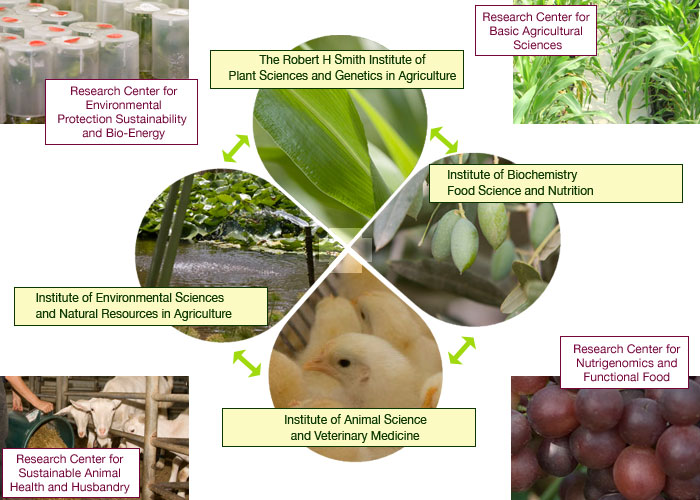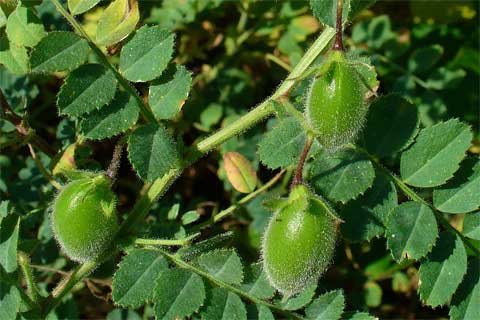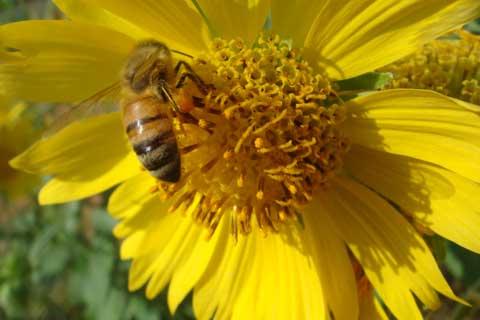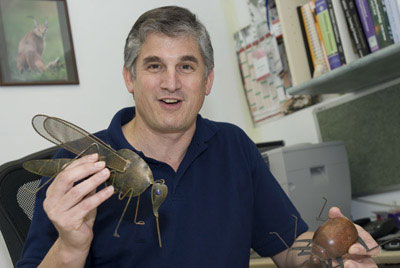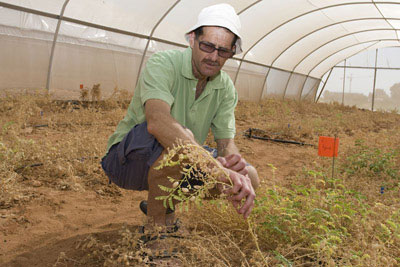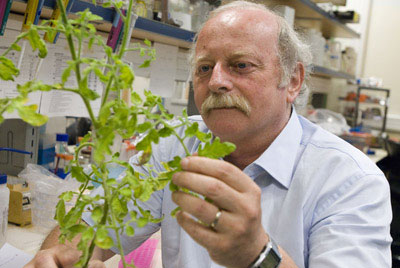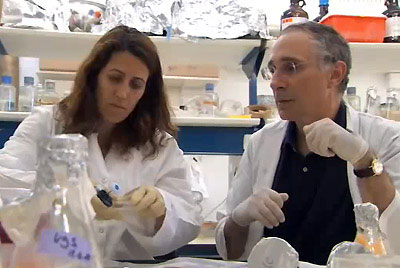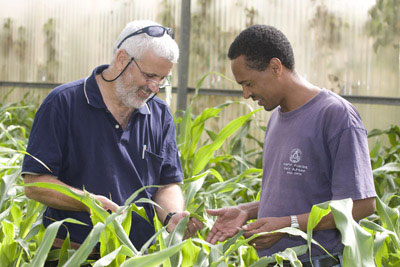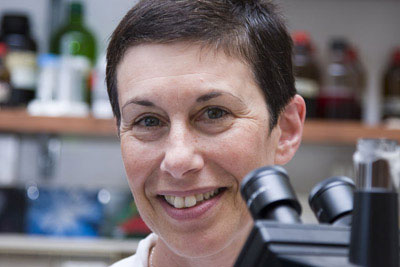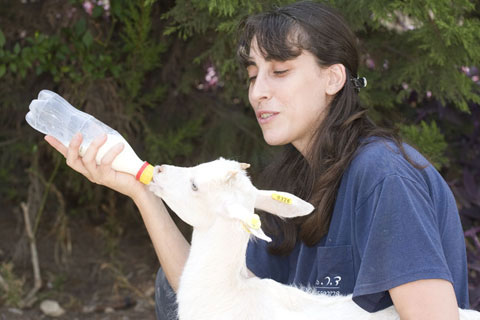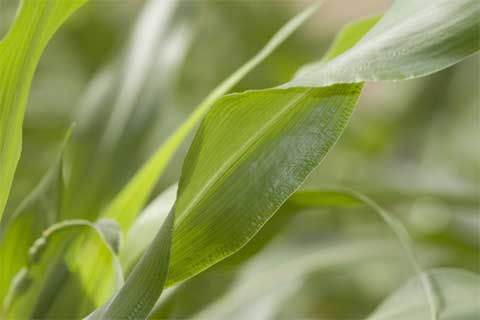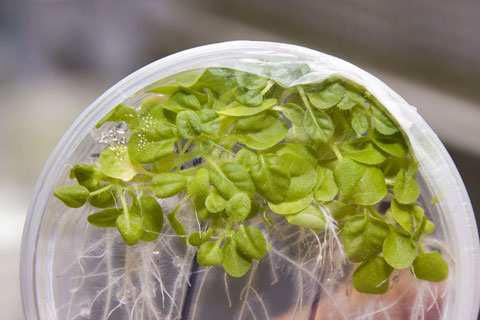FEEDING THE WORLD THROUGH SUSTAINABLE AGRICULTURE
The Robert H. Smith Faculty of Agriculture, Food and Environment
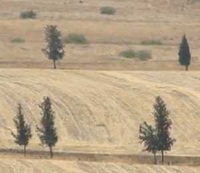
The world is changing: populations are expanding steadily, while food sources and natural resources are dwindling. Of the world's 194 nations, 54 currently do not meet their citizens' need for food and other basic staples of life. Among the environmental challenges facing our planet are pollution, erosion, scarce and non-potable water and soil depletion. These conditions are exacerbated, and in some instances created, by climate change. In some parts of the world obesity and diabetes are on the rise while in other locales, people suffer from chronic hunger and malnutrition.

With our collective future at stake, The Hebrew University of Jerusalem, Israel's leader in agricultural and animal sciences as well as in biochemistry, microbiology and veterinary medicine, is spearheading a major physical and structural transformation at its Robert H. Smith Faculty of Agriculture, Food and Environment in Rehovot. The purpose of this dramatic new vision is to promote the essential goal of "Feeding the World" is met.
AGRICULTURAL INNOVATION SINCE 1942
Since the inception of its Faculty of Agriculture in 1942, even before the State of Israel was founded, The Hebrew University has generated advances vital to Israel's well being, economic strength and agricultural productivity. These innovations have become increasingly crucial to our global community as well.

A "Feeding the World through Sustainable Agriculture" campaign launched by The Hebrew University in tandem with American Friends of The Hebrew University (AFHU), will boost the university's capabilities in sustainable agriculture and environmental conservation. The Robert H. Smith Faculty of Agriculture, Food and Environment is being expanded into a pioneering four Institute model. The research and educational effectiveness of these four key Institutes will be enhanced by the further creation of four interdisciplinary Research Centers dedicated to environmental and agricultural problem-solving. A vital combination of physical expansion, academic reorganization, and interdisciplinary research projects at the Robert H. Smith Faculty will address 21st century scientific challenges and serve important global objectives for sustainable agriculture.
BUILDING ON A RECORD OF ACHIEVEMENT
The Robert H. Smith Faculty of Agriculture, Food and Environment is ranked among the top 30 agricultural schools worldwide. It is known for its academic programs at the undergraduate and graduate level, for exceptional basic and applied research, and for educating international students through the Division of External Studies. The Faculty's many achievements include:
- drip irrigation and ground cover technology
- raising fish for protein
- removing contaminants from wastewater
- cultivating robust crops
- improving food quality
- sustainable pest management
- Transforming Israel's arid terrain into useable farmland by developing effective drip irrigation techniques and, more recently, cover technology -- methods adopted across the globe.
- Increasing healthy protein sources by closed-system, non-polluting, freshwater ponds. These methods are being taught in Uganda Africa in order to alleviate famine, and to increase local agricultural self-sufficiency.
- Developing the means to remove heavy metals from wastewater and recycling this residue into marketable metallic nano-particles. This technology is life-saving.
- Cultivating robust hybrid varieties of peppers - one of Israel's leading exports -- and developing new methods to extend the shelf life of tomatoes -- the world's most popular fruit. Produce is similarly being enhanced with added nutrients to address vitamin deficiencies in many populations.
- Increasing the availability and yield of the wild chickpea, a legume particularly rich in protein as well as antioxidants. Creating chickpea-based baby formula for lactose intolerant infants.
- Combining behavioral ecology of microbes and insects to improve organic forms of pest management in the Middle East and elsewhere in the world.
These and myriad other successful innovations will be expanded through the four-pillar transformation at The Robert H. Smith Faculty.
ACHIEVING SUSTAINABLE AGRICULTURE: AN INTEGRATED VISION
Achieving sustainable agriculture requires an integrated, interdisciplinary approach to scientific research along with sound public policy responsive to environmental threats. Nothing short of a full-scale paradigm shift - one that treats agriculture as a process and organizes it in new ways to protect our planet - will enable scientists to develop renewable means of feeding growing global populations now and for generations to come.
To implement this paradigm shift, the Robert H. Smith Faculty embraces a far-sighted organizational model that unites a powerful intellectual community of scientists. Leading faculty members with expertise in diverse fields are combining their strengths to foster the goals of the Green Revolution.
THE ROBERT H. SMITH INSTITUTE FOR PLANTS SCIENCES AND GENETICS IN AGRICULTURE:
A SUCCESSFUL INTERDISCIPLINARY MODEL
The Hebrew University is Israel's standard bearer in agriculture and it's Robert H. Smith Institute for Plant Sciences and Genetics in Agriculture has provided a successful prototype for dynamic research integration. The establishment of the Smith Institute brought together scientists with specialties in Agricultural Botany; Field Crops, Vegetables and Genetics; and Horticulture. This cross-fertilization of academic disciplines increased crop productivity and produced new technologies for developing hardier, qualitatively improved crops capable of withstanding environmental stresses. Today, the Robert H. Smith Institute for Plant Sciences and Genetics in Agriculture serves as Israel's largest academic Institute of its kind and boasts of an impressive array of plant science breakthroughs.
FOUR INSTITUTES: FOUR PILLARS OF PRODUCTIVITY
What the Robert H. Smith Institute did for plant sciences, the new four Institute model will accomplish on a broader scale at the Smith Faculty of Agriculture, Food and Environment.
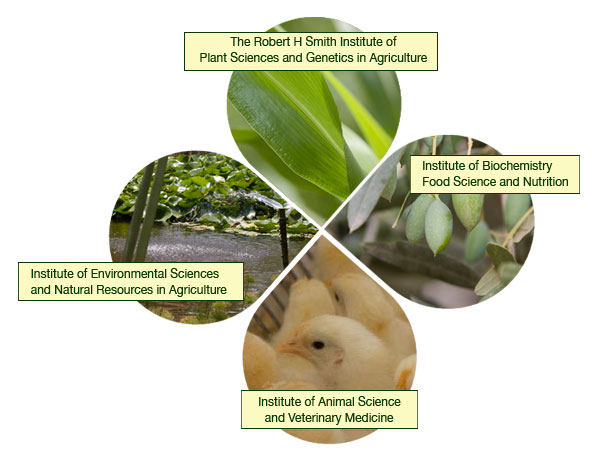
The future four institute model reflects the full continuum of agricultural production. Interdisciplinary research projects will cover the study of resources, mechanisms of food production and the viability of food products. This vital work, much of it currently underway, will, we hope, yield agricultural, ecological and health-oriented solutions essential to people worldwide.
Two pillars currently exist: In addition to the Robert H. Smith Institute for Plant Sciences and Genetics in Agriculture, Hebrew University has a highly effective Institute of Biochemistry, Food Sciences and Nutrition. The latter unit investigates the effects of nutrients on human health at the molecular, cellular and physiological levels, studies the therapeutic properties of vegetables and fruits, and examines the impact of diet and nutrition on health and longevity. A key specialty is the development of functional foods with disease-fighting and health-enhancing properties.
ACHIEVING SUSTAINABLE AGRICULTURE: AN INTEGRATED VISION
Two additional research pillars will be established:
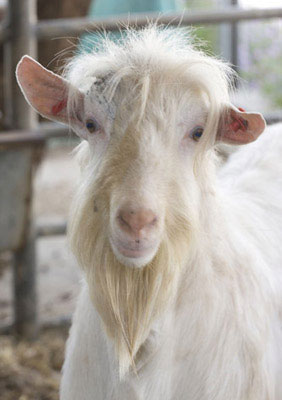
The new Institute for Animal Sciences and Veterinary Medicine.
In this new unit the existing Department of Animal Sciences and the Koret School of Veterinary Medicine, while maintaining their functional independence, will combine forces in order to foster collaboration in vital aspects of farm animal bio-sciences.
The Department of Animal Sciences investigates the physiology of reproduction; stress physiology: animal growth and development as affected by environmental impact; and aquaculture.
The Koret School for Veterinary Medicine pursues crucial aspects of medicine such as viral oncology and retroviruses, comparative oncology, neonatal diseases and infectious diseases of animals. Veterinarians practice small and large animal surgery, study large animal reproduction and ruminant metabolic diseases, and work to control zoonoses (diseases transmitted from animals to humans) and tropical diseases in pets. Clinical pharmacology is another specialty.
While maintaining their independent work, the combined units within the new institute will foster joint scientific collaboration, allowing Israel to continue excelling in farm animal bio-sciences and promoting disease control, particularly regarding the transmission of animal diseases to humans.

The Institute of Environmental Sciences and Natural Resources in Agriculture.
This Institute, which will have its own dedicated building on the Rehovot campus, will bring together top researchers in fields ranging from plant pathology and microbiology to entomology and soil and water sciences.
Combining the departments of:
Soil and Water Sciences,
Entomology,
Plant Pathology and Microbiology and
Agricultural Economics and Management,
this new Institute will spearhead new ways to manage natural resources and
work towards greater, cleaner, and safer crop productivity.
FOUR NEW RESEARCH CENTERS WITHIN THE FOUR INSTITUTE MODEL
The Hebrew University will also establish four interdisciplinary research centers that will advance crucial aspects of plant and animal science, health and nutrition. These Research Centers include:
- Nutrigenomics and Functional Food
- Sustainable Animal Health and Husbandry
- Environmental Protection, Sustainability and Bio-energy
- Basic Agricultural Sciences
- The Research Center for Nutrigenomics and Functional Food gains its strength from Hebrew University's interdisciplinary expertise in molecular plant and applied plant sciences. Researchers have studied human nutrition with special emphasis on children, the aging and those with special health requirements. Food chemistry and technology are among the Center's areas of concentration. Researchers will investigate the beneficial dietary factors of functional foods in order to reduce the rising worldwide occurrence of diet-related diseases and disorders. They seek to reformulate processed foods and develop new foods and ingredients with nutritional and health benefits.
- The modern livestock industry makes excessive use of drugs and pharmaceuticals to combat infectious diseases. Thus, reducing pharmaceutical usage is a major objective in sustainable agricultural practice and animal research. The Research Center Sustainable Animal Health and Husbandry will investigate ways to produce novel, safe and potent vaccines to prevent infectious diseases, boost natural immunity, and alleviate the need for excessive drug use in livestock rearing.
Animal welfare is becoming an increasingly important issue in the livestock industry. New avenues are being sought to reduce animal densities during the growth period to provide a more humane, but not less productive, environment. The new Research Center will take a novel approach to animal husbandry so that production is maintained while animals are allowed to live under non-stressful conditions. - Israel, among other nations, is battling to protect its natural environment, arrest desertification and develop alternative energy resources. The Research Center for Environmental Protection will focus on such projects as reclaiming wastewater, developing new crops for alternative renewable bio-energy sources and warding off desertification. While Israel is unique in its success at reclaiming wastewater, thanks to the Smith Faculty of Agriculture, continued research will attempt to reduce the risk of bio-accumulation and
(eco)-toxicological effects in recycled water, and to find ways to prevent the development of resistant microbial strains and groundwater contamination.
Another major concern is the production and utilization of renewable bio-resources, such as for renewable alternative energy. This universal need can be met through innovation and advancement of knowledge in the sustainable management, production and use of crops as energy sources. Faculty research will dissect the genetic basis of one or more specified traits required for selective improvement of plants useful as energy sources. -
In order to further develop agro-technology, researchers need to focus on advances in basic sciences. The Research Center for Basic Agricultural Sciences will explore fundamental questions, focusing on bacteria, fungi, harmful and beneficial insects, plants, and vertebrates at the molecular, organismic and community levels of biological organization.
Using the latest molecular technology, researchers will identify and manipulate genes and their products with the objective of increasing food production and protecting the environment. Scientists will draw upon their expertise in state-of-the-art disciplines, among these Genomics (the study of genes), Transcriptomics (studies of the expression level of genes) and Proteomics (the large-scale study of proteins).
The Basic Agricultural Sciences Research Center will seek to identify the means of improving food production based on a detailed and rigorously researched biological understanding of how systems work. Scientists' knowledge of molecular and organismic biology will be harnessed to stabilize deteriorating ecosystems. Important work concerns new ways in which societies can successfully manage populations of pests, pathogens and invasive species, at the same time protecting local biodiversity.
I. The Research Center for Nutrigenomics and Functional Food
The Research Center for Nutrigenomics and Functional Food gains its strength from Hebrew University's interdisciplinary expertise in molecular plant and applied plant sciences. Researchers have studied human nutrition with special emphasis on children, the aging and those with special health requirements. Food chemistry and technology are among the Center's areas of concentration. Researchers will investigate the beneficial dietary factors of functional foods in order to reduce the rising worldwide occurrence of diet-related diseases and disorders. They seek to reformulate processed foods and develop new foods and ingredients with nutritional and health benefits.
II. The Research Center for Sustainable Animal Health and Husbandry
The modern livestock industry makes excessive use of drugs and pharmaceuticals to combat infectious diseases. Thus, reducing pharmaceutical usage is a major objective in sustainable agricultural practice and animal research. This Center will investigate ways to produce novel, safe and potent vaccines to prevent infectious diseases, boost natural immunity, and alleviate the need for excessive drug use in livestock rearing.
Animal welfare is becoming an increasingly important issue in the livestock industry. New avenues are being sought to reduce animal densities during the growth period to provide a more humane, but not less productive, environment. The new Research Center will take a novel approach to animal husbandry so that production is maintained while animals are allowed to live under non-stressful conditions.
III. The Research Center for Environmental Protection, Sustainability and Bio-energy
Israel, among other nations, is battling to protect its natural environment, arrest desertification and develop alternative energy resources. The Research Center for Environmental Protection will focus on such projects as reclaiming wastewater, developing new crops for alternative renewable bio-energy sources and warding off desertification. While Israel is unique in its success at reclaiming wastewater, thanks to the Smith Faculty of Agriculture, continued research will reduce the risk of bio-accumulation and (eco)-toxicological effects in recycled water, and finds ways to prevent the development of resistant microbial strains and groundwater contamination.
Another major concern is the production and utilization of renewable bio-resources, such as for renewable alternative energy. This universal need can be met through innovation and advancement of knowledge in the sustainable management, production and use of crops as energy sources. Faculty research will dissect the genetic basis of one or more specified traits required for selective improvement of plants useful as energy sources.
IV. Research Center for Basic Agricultural Sciences
In order to further develop agro-technology, researchers need to focus on advances in basic sciences. The Research Center for Basic Agricultural Sciences will explore fundamental questions, focusing on bacteria, fungi, harmful and beneficial insects, plants, and vertebrates at the molecular, organismic and community levels of biological organization.
Using the latest molecular technology, researchers will identify and manipulate genes and their products with the objective of increasing food production and protecting the environment. Scientists will draw upon their expertise in state-of-the-art disciplines, among these Genomics (the study of genes), Transcriptomics (studies of the expression level of genes) and Proteomics (the large-scale study of proteins).
The Basic Agricultural Sciences Research Center will identify the means of improving food production based on a detailed and rigorously researched biological understanding of how systems work. Scientists' knowledge of molecular and organismic biology will be harnessed to stabilize deteriorating ecosystems. Important work concerns new ways in which societies can successfully manage populations of pests, pathogens and invasive species, at the same time protecting local biodiversity.
PROPELLING THE REHOVOT TRANSFORMATION
Quality research and development depends on availability of crucial resources -physical and intellectual.
The Feeding the World campaign includes building state-of-the-art laboratories, classrooms and greenhouses plus upgrading existing facilities. These combined resources will spur innovation and increase the ability of Israel's top plant and animal scientists to meet global challenges.
Please contact a
Friends of Hebrew University organization in your country of origin to find out how you can support this vital work in sustainable agriculture and environmental conservation.
The four-pillar transformation at Hebrew University's Robert H. Smith Faculty will ensure that Israel, a country which has overcome many environmental and agricultural challenges, can continue lead the way in sustainable agriculture for the benefit of people worldwide.
Tour the Campus Watch Research in Action
Learn more:
Imagine: Feeding the World Through Sustainable Agriculture Giving Opportunities
